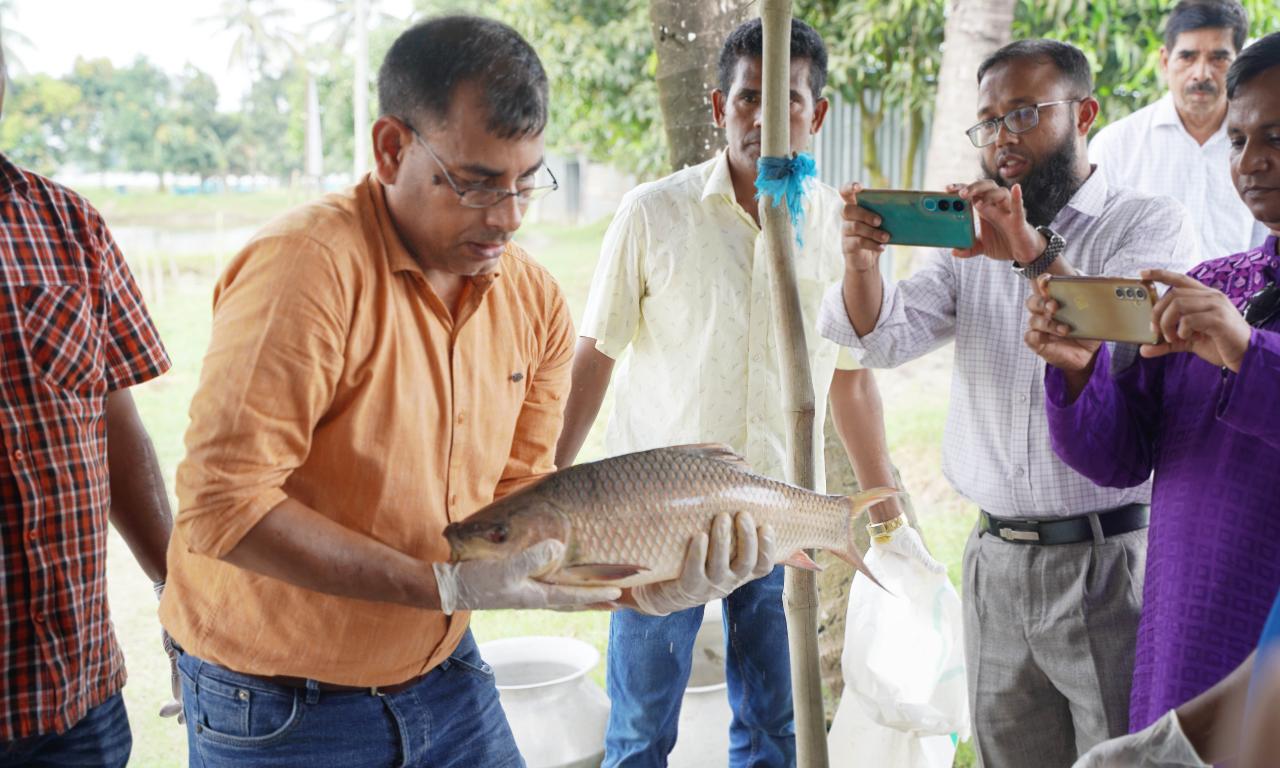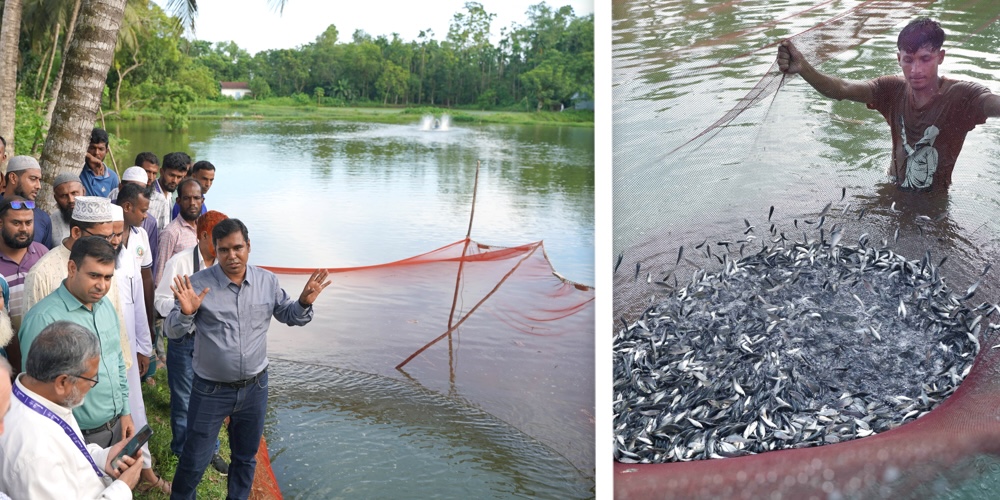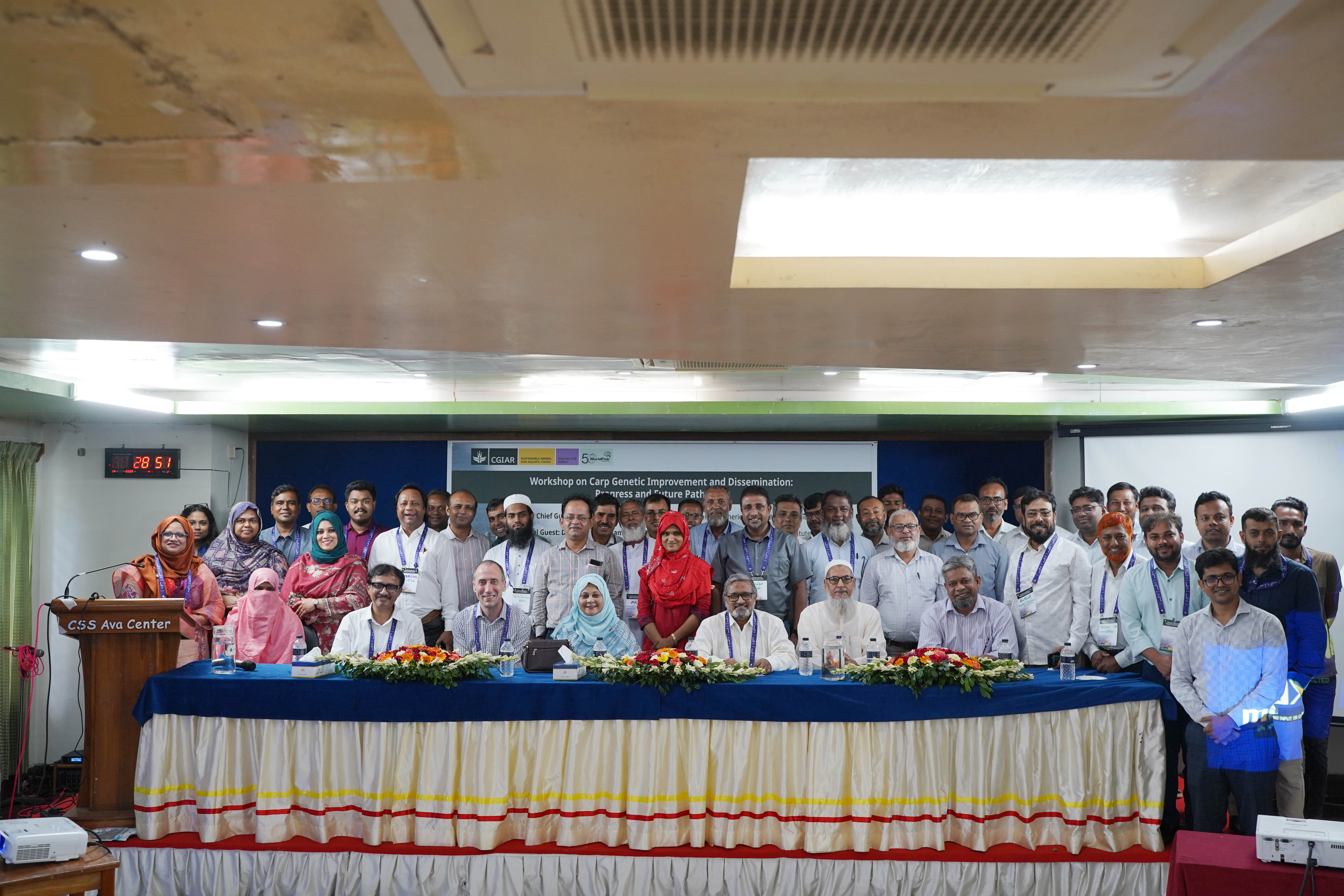
- WorldFish and partners are advancing carp genetics in Bangladesh through a family-based selective breeding approach.
- G3 rohu, which grows 37% faster than local strains, now benefits more than 200,000 farmers each year in the country.
- G5 rohu, expected to grow more than 50% faster, is currently under field trials.
- Work on other species continues, with G4 silver carp and G3 catla expected in the coming years.
- Long-term collaboration with the public and private sectors remains key to sustaining and scaling impacts nationwide.
Carp is the most important group of fish species in Bangladesh, accounting for over half of the country’s aquaculture production. Yet, for decades, the productivity and profitability of carp farming has been held back by limited access to improved strains—something that is now beginning to change.
WorldFish and partners are leading efforts to develop and disseminate faster-growing carp strains through a family-based selective breeding approach. Current efforts are focused on three key species: rohu (Labeo rohita), catla (Catla catla), and silver carp (Hypophthalmichthys molitrix), species that together account for over one-third of Bangladesh’s aquaculture output.
Collaboration in Focus: The Khulna Workshop
To reflect on progress and shape next steps, WorldFish Bangladesh hosted a workshop titled “Carp Genetic Improvement and Dissemination: Progress and Future Pathways” on 24–25 September 2025 in Khulna. Organized under the CGIAR Sustainable Animal and Aquatic Foods (SAAF) and Scaling for Impact (S4I) programs, the event brought together participants from government agencies, universities, hatcheries, nurseries, and farmer groups, reflecting a strong spirit of collaboration across Bangladesh’s aquaculture community.
During the workshop, participants reviewed the progress of the WorldFish Carp Genetic Improvement and Dissemination Program (CGIDP) and explored its future pathways. They also visited an ongoing G5 rohu on-farm trial in Bagerhat and the program’s breeding facility in Jashore. These visits gave participants first-hand insights into how carp genetics is advancing in the field.
The event was graced by Mr. Md. Zahangir Alam, Director of the Department of Fisheries for Khulna Division, as Chief Guest, and Dr. Md. Latiful Islam, Chief Scientific Officer at the Bangladesh Fisheries Research Institute, as Special Guest.

Making Steady Gains, Generation by Generation
Since its inception in 2012, the WorldFish carp program has made steady and meaningful progress. G3 rohu, which grows 37% faster than local strains (Hamilton et al., 2022), now reaches more than 200,000 farmers each year. G5 rohu, currently under on-farm trials, is expected to grow over 50% faster than unimproved strains, offering farmers even greater potential for higher yields and shorter production cycles.
Work on other species is also advancing, with G4 silver carp and G3 catla expected in the coming years. These improved generations are not just about faster growth; they mean higher productivity and profitability for farming households. As productivity rises, the availability and affordability of fish also increase in local markets, helping improve food and nutrition security for communities nationwide.
The progress achieved so far reflects not only scientific success but also a shared commitment—among government, research, and private partners—to turn genetic innovation into real benefits for people.

Sustaining Progress Through Partnership
Throughout the workshop, participants agreed that sustained collaboration among government agencies, the private sector, and research institutes is essential to maintain progress in genetic improvement and dissemination.
“Genetic improvement is a continuous process,” said Professor Md. Samsul Alam of Bangladesh Agricultural University. “We must keep developing new generations to move forward, and long-term collaboration with the government and the private sector is key to making that happen.”
By fostering enduring partnerships and investing in scientific excellence, WorldFish and its collaborators aim to ensure that improved carp strains continue to enhance productivity, boost farmers' income, and build a more food-secure and resilient Bangladesh.

